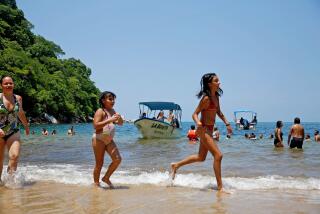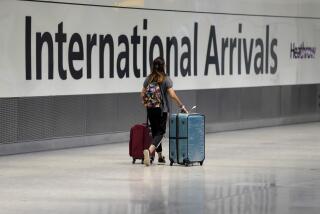Raw Seafood Causes Cholera Epidemic in Peru
- Share via
World Travel Watch is a monthly report designed to help you make informed judgments about travel. Because conditions can change overnight, always make your own inquiries before you leave home. In the United States, contact your Passport Agency office; abroad, check in with the nearest American embassy. For more information on safety concerns in countries you may be visiting, contact the Citizens Emergency Center, U.S. Department of State, Washington, D.C. 20520, (202) 647-5225 or (213) 647-1512 (after hours).
Global Security Update
The war in the Persian Gulf has created a need for special caution when traveling abroad, particularly to countries in the Middle East. The only new travel advisories on the region issued by the U.S. Department of State regard the invalidation of U.S. passports for travel to Iraq or Kuwait without special permission. Travel to southeastern Turkey should be avoided, but the western region, which includes Istanbul, Ankara and Izmir, remains relatively unaffected.
Worldwide Updates
South America
Peru: A serious cholera epidemic caused by eating raw seafood is occurring in Lima. Ceviche, a popular dish of marinated raw fish, is believed to be the main culprit, especially at beachside food stalls. Although the epidemic has killed at least 134 people and sickened thousands, at press time no tourists were reported to have contracted the disease. Unsanitary conditions exist along the beaches because raw sewage flows into the sea. Avoid the beaches at this time and do not eat uncooked foods. Drink only bottled beverages or thoroughly boiled or treated water. Also in Lima, the pro-Cuba Tupac Amaru Revolutionary Movement has targeted American fast-food restaurants for bombing, allegedly in response to U.S. actions in the war with Iraq. Two outlets have been destroyed in recent days.
Southeast Asia
Thailand: The military staged a bloodless coup Feb. 23 in a move to end alleged corruption, due in part to the country’s booming economy. Coups are nothing new to this country, and the people are taking it in stride. Martial law is ineffect throughout the country, but with no curfew or unusual military presence in Bangkok’s streets, it is unlikely that travel will be affected. However, the U.S. State Department has issued a warning for travelers to Thailand, advising caution in light of the military coup and declaration of martial law. The advisory also warns of possible terrorist acts against U.S. installations in Bangkok due to the war in the Persian Gulf.
Europe
Albania: Unrest in the capital city of Tirana has grown violent, with the possibility of a military coup to maintain order. If a coup does not occur, the process leading up to scheduled March elections could still be unruly. Avoid travel here at this time.
Yugoslavia: Tensions remain high in Kosovo and Croatia, with demonstrations occurring sporadically in certain regions. Some roads and rail lines in Croatia have been temporarily blocked, and travelers visiting the coastal areas should travel by air. Secession by Croatia and Slovenia is increasingly likely, with uncertain consequences.
Central America
Guatemala: There have been several incidents of armed assault against people climbing Pacaya Volcano near Guatemala City. Two were killed in a recent attack. Road travel should be confined to daylight hours, and special caution should be used when traveling on public buses due to an increase in robberies.
Asia
India: In the state of Assam, in the northeastern part of the country, a major insurgent group has indicated willingness to negotiate with the central government over linguistic, religious and political issues. Assam has suffered from violence and tension for the past three years.
Africa
Cameroon: In 1986, carbon dioxide released from the bottom of Lake Nyos, in the volcanic region of the country, killed 1,700 people. Scientists warn that another such event is possible, since millions of cubic feet of the gas has again accumulated under the lake.
Rwanda: Rwandan exiles are fighting government troops along the border with Uganda, and in areas along the border with Tanzania, including Akagera Game Park and Volcano National Park. A curfew is in effect throughout Rwanda, and there are roadblocks and checkpoints in the capital of Kigali and outlying regions. Don’t travel to the prefectures of Gisenyi, Ruhengeri, Byumba and Kibungo.
Uganda: Travel to the capital city of Kampala is generally safe, but watch for pickpockets. Northern Uganda should be avoided because of insurgent activity. Visits to the gorillas on Mt. Sabinyo should not be made at this time. Travel around Uganda’s borders with Kenya and Sudan should be avoided, as should the north bank of the Nile in Murchison Falls National Park.
More to Read
Sign up for The Wild
We’ll help you find the best places to hike, bike and run, as well as the perfect silent spots for meditation and yoga.
You may occasionally receive promotional content from the Los Angeles Times.






